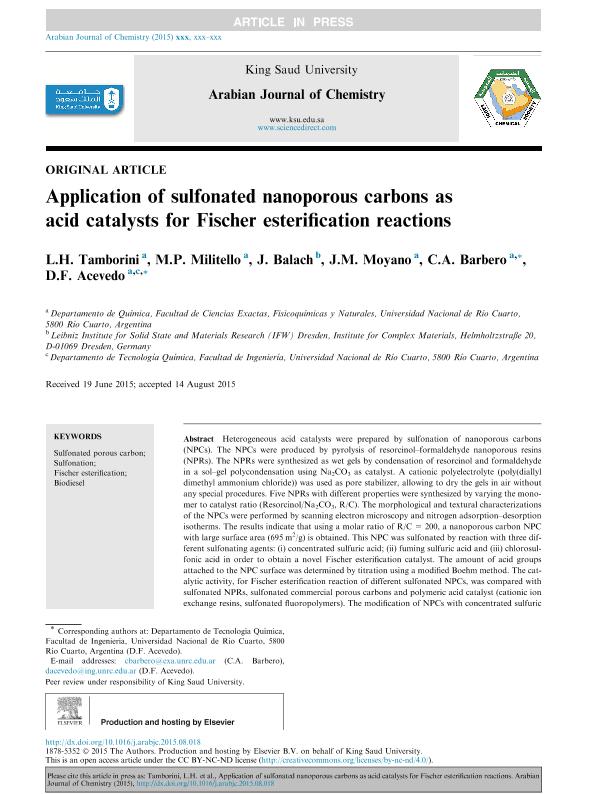Artículo
Application of sulfonated nanoporous carbons as acid catalysts for Fischer esterification reactions
Tamborini, Luciano Henri ; Militello, María Paula
; Militello, María Paula ; Balach, Juan Manuel
; Balach, Juan Manuel ; Moyano, J. M.; Barbero, César Alfredo
; Moyano, J. M.; Barbero, César Alfredo ; Acevedo, Diego Fernando
; Acevedo, Diego Fernando
 ; Militello, María Paula
; Militello, María Paula ; Balach, Juan Manuel
; Balach, Juan Manuel ; Moyano, J. M.; Barbero, César Alfredo
; Moyano, J. M.; Barbero, César Alfredo ; Acevedo, Diego Fernando
; Acevedo, Diego Fernando
Fecha de publicación:
06/2015
Editorial:
Elsevier
Revista:
Arabian Journal of Chemistry
ISSN:
1878-5352
Idioma:
Inglés
Tipo de recurso:
Artículo publicado
Clasificación temática:
Resumen
Heterogeneous acid catalysts were prepared by sulfonation of nanoporous carbons (NPCs). The NPCs were produced by pyrolysis of resorcinol-formaldehyde nanoporous resins (NPRs). The NPRs were synthesized as wet gels by condensation of resorcinol and formaldehyde in a sol-gel polycondensation using Na2CO3 as catalyst. A cationic polyelectrolyte (poly(diallyl dimethyl ammonium chloride)) was used as pore stabilizer, allowing to dry the gels in air without any special procedures. Five NPRs with different properties were synthesized by varying the monomer to catalyst ratio (Resorcinol/Na2CO3, R/C). The morphological and textural characterizations of the NPCs were performed by scanning electron microscopy and nitrogen adsorption-desorption isotherms. The results indicate that using a molar ratio of R/C=200, a nanoporous carbon NPC with large surface area (695m2/g) is obtained. This NPC was sulfonated by reaction with three different sulfonating agents: (i) concentrated sulfuric acid; (ii) fuming sulfuric acid and (iii) chlorosulfonic acid in order to obtain a novel Fischer esterification catalyst. The amount of acid groups attached to the NPC surface was determined by titration using a modified Boehm method. The catalytic activity, for Fischer esterification reaction of different sulfonated NPCs, was compared with sulfonated NPRs, sulfonated commercial porous carbons and polymeric acid catalyst (cationic ion exchange resins, sulfonated fluoropolymers). The modification of NPCs with concentrated sulfuric acid seems to render the materials with more catalytic activity. The best sulfonated material NPC (PC200-H2SO4) shows a high catalytic activity for the esterification of acetic acid (90.8%) and oleic acid (60.6%) with ethanol. The conversion and conversion rate values are better than commercial acid catalysts. The results suggest that sulfonated NPC catalysts are promising materials for the synthesis of biodiesel and related reactions.
Palabras clave:
Biodiesel
,
Fischer Esterification
,
Sulfonated Porous Carbon
,
Sulfonation
Archivos asociados
Licencia
Identificadores
Colecciones
Articulos(CCT - CORDOBA)
Articulos de CTRO.CIENTIFICO TECNOL.CONICET - CORDOBA
Articulos de CTRO.CIENTIFICO TECNOL.CONICET - CORDOBA
Citación
Tamborini, Luciano Henri; Militello, María Paula; Balach, Juan Manuel; Moyano, J. M.; Barbero, César Alfredo; et al.; Application of sulfonated nanoporous carbons as acid catalysts for Fischer esterification reactions; Elsevier; Arabian Journal of Chemistry; 6-2015; 1-11
Compartir
Altmétricas



